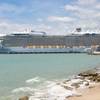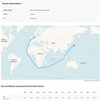The maritime research project SAFEDOR has made considerable progress within the first year of its four year term. A one-day public workshop in London at IMO on 14 February 2006 jointly organized with the Royal Institution of Naval Architects will highlight some of the findings.
The European Commission-supported, risk-based ship design research project launched a year ago, has successfully completed its first year of intensive research activities. The workshop provides an excellent opportunity for maritime engineers to familiarize with the principles underlying the concept and practical applications of risk-based ship design. In this approach, safety levels are considered as objectives of the design process from the outset, rather than being treated as a constraint, as is the case using today's conventional ship design methods and prescriptive rules. The new approach provides scope for novel and inventive design solutions and, therefore, encourages innovation.
A total of 53 project partners from all sectors of the maritime industry in Europe are participating in the research project "Design, Operation and Regulation for Safety". SAFEDOR is coordinated by Germanischer Lloyd. The research project recognises the key role played by European companies in the design, construction and operation of modern, seagoing vessels. European expertise and involvement are particularly strong for those sophisticated ship types where safety is afforded the highest priority, e.g. roll-on/roll-off passenger ships, cruise ships, gas tankers and container ships. While the work of the EU-funded project is aimed at achieving advances in maritime safety that will benefit the international shipping community, it is also envisaged that the competitiveness of European companies will be enhanced.
SAFEDOR covers many of the challenges confronting the maritime industry, e.g. the high expectations of the public in terms of the safe performance of ships; the strong quest to provide innovative and more competitive designs; the increasing complexity of equipment, materials and systems used onboard ship; and the need to consider, at the design stage, the full working life of a ship.
Subscribe for
Maritime Reporter E-News
Maritime Reporter E-News is the maritime industry's largest circulation and most authoritative ENews Service, delivered to your Email five times per week










